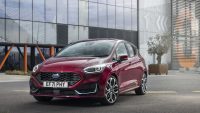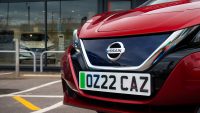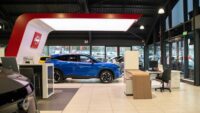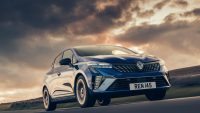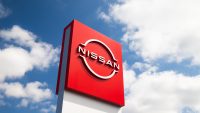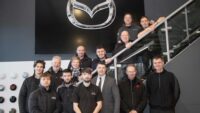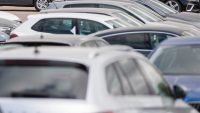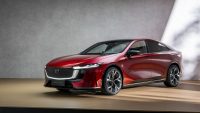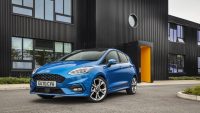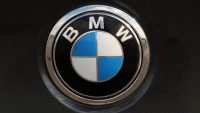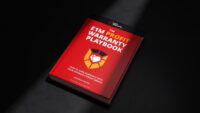BMW has climbed the rankings and been named as Manufacturer of the Year at the Car Dealer Power Awards 2025.
The German carmaker secured outstanding scores across multiple categories, and received high praise from its dealer network.
Toyota, champion in 2023, finished second, while multiple winner Kia rounded off the top three.
Meanwhile, Ford came rock bottom in the survey – 23rd out of 23 car manufacturers.
Car Dealer Power asks dealers across the UK to rank their manufacturer partners in 13 categories that cover all areas of the franchise. The scores for the individual categories are then taken to create the overall score.
The full results, brand by brand, are revealed further on in this story. This year’s scores were lower than 2024’s, with BMW topping the table with 84.3% compared with Suzuki’s chart-topping score of 90.8% 12 months ago.
Speaking about the win, BMW UK sales director Debbie McIntosh expressed just how much the accolade means to the brand.
‘It’s just an amazing, fantastic recognition for us, and it really means so much because it’s voted for by our retail partners,’ she said.’It really shows us that we’re getting the things that matter right, and I know it’s just going to be a huge motivation for the team to continue to build on the strength of partnership that’s so important to us.’
BMW impressed dealers this year with excellent scores for brand awareness and communication, as well as for being straightforward to work with.
Reflecting on why dealers are so pleased, McIntosh added: ‘I think it comes down to clarity. We have a very clear product strategy, very clear plans for the year.
‘A lot is around communication and, of course, consistency. I think these things are really important for our retail partners, and we’ve worked really hard on just trying to do things simpler and being easier to work with.’
Dealer relationships have clearly been a priority for the brand, too.
‘We’ve really worked hard to strengthen those relationships. It’s all about supporting our retailers so they can deliver an absolutely awesome customer experience — it’s a win-win for both of us.’
Looking ahead, BMW has plenty in the pipeline.
‘We’ve got an amazing new generation of electric vehicles coming — the Neue Klasse — which everyone will be hearing about in the months ahead.’
Ending on a high note, BMW’s message to its dealers was simple: ‘We absolutely rely on you, we trust you, and we wish you every success for the year ahead.’
In this story, you can view all the manufacturers that received the minimum number of responses (10) to be included in the survey.
Manufacturers that did not receive the minimum number of responses are not included.
Scores in each category are taken into account to give manufacturers their overall rating to one decimal point. The manufacturer’s rise or fall in position is included in brackets.
Car Dealer Power 2025: Where did your manufacturer rank?
BMW has held steady in third place for the past couple of years, and has routinely been in the top 10. But in 2025, dealers voted it to be the best in the business with an overall score of 84.3%. It earned top praise across the board, especially in finance, used cars, and brand awareness. The German firm also received high scores in marketing and aftersales, and even in areas like bonus structure and ROI, BMW impressed. It’s clear dealers value BMW’s blend of prestigious brand image, support from HQ, and it being a profitable partnership.
Holding onto second place for two years on the trot, 2023’s overall winner received strong praise for supply, marketing support, and aftersales. The brand’s reliability is mirrored in dealer confidence, with high marks in ROI, warranty backing, and forward planning. Clear requirements and bonus transparency topped off a very strong score. Dealers value Toyota’s steady supply chains and strategic rollout of models like hybrids and bZ-series EVs. With such strong performances over the past three years, it would seem Toyota has cracked what its dealers value and is supporting them well.
Up one place this year, Kia stood out for its surge in market presence and dealer support, earning strong feedback in marketing, new car supply, and ROI predictions. Dealers praised Kia’s access to mid-market EVs and crossovers, backed by robust brand awareness campaigns and incentive structures. An encouraging performance from this previous multiple winner of Car Dealer Power.
Last year’s overall winner slipped three places this year, but this is still an impressive showing from a much smaller manufacturer compared to those around it. Dealers are impressed with the Japanese firm’s small-car range, simpler sales structure, and lean operations. The brand received high marks for accessibility, marketing efficiency, and used car support. It’ll will be interesting to see how the brand performs in Car Dealer Power 2026, as dealers will be selling Suzuki’s first full-EV from later this year.
BYD’s debut in Car Dealer Power last year was impressive considering it had arrived in the UK just 12 months earlier. Bosses will likely be over the moon with this performance in 2025, as the Chinese brand has leapt up the table by 10 places with a very strong score of 79.5%. Dealers praised accessibility, straightforward warranty handling, EV product potential, along with forward planning and bonus structures. However, scores for used cars and ROI were modest, suggesting that long-term profitability and established aftersales networks are still under development – these are areas BYD will need to focus on.
Mercedes-Benz should be proud of this performance as it has risen five places on last year’s ranking. It received strong scores in warranty and new car supply, and topped the entire survey in brand awareness with a score of 92. However, bonus structure, requirements, marketing and finance dragged its overall performance down slightly, suggesting there’s room for improvement in communication and long-term strategic planning.
Along with MG, Volvo rose the most number of places in this year’s survey, up a whopping 16 places. It’s clear Volvo has listened to its dealers’ concerns and has reacted accordingly, with dramatic improvements in marketing brand, accessibility, requirements, bonus structure, and ROI, compared to last year’s scores. New car supply has remained pretty consistent, indicating that the agency sales model Volvo operates is working for dealers.
Renault’s results in the dealer survey showed mixed performance, with strong scores in warranty and marketing but lower marks in ROI, bonus structure, and forward planning. Dealers appreciated improvements in brand visibility and aftersales, but concerns remain about new car supply consistency and the complexity of performance targets. Used car support was also flagged as an area for growth. With new models such as the 4 and 5 EVs coming on stream this year, 2026’s performance will be interesting to see.
Tying with Volvo for most improved brand in Car Dealer Power 2025, MG’s bosses will surely be breathing a sigh of relief at this performance. In 2024 the Chinese-owned British brand crashed to last place, but this top-10 finish shows MG is listening to its dealers’ concerns and acting on them. Dealers praised the brand’s value-led proposition, strong EV lineup, and rapid growth in brand awareness. MG’s simple bonus structures and reliable supply chains scored well, though requirements and marketing support saw more modest ratings, and a 61 score for aftersales shows there’s room for improvement next year.
Seat recorded a pretty strong performance this year, up nine places to sneak into the top 10. Dealers gave it positive scores for warranty handling and forward planning but more modest results in marketing and ROI. Dealers noted a drop in brand visibility compared to previous years, with concerns around model differentiation and supply consistency. While the used car programme was good, bonus structures and communication were cited as needing improvement. Seat’s partnership with Cupra was viewed as both a strength and a distraction, with some dealers uncertain about long-term strategy. Overall, Seat remains a reliable franchise, but it requires renewed investment in network support and product identity to climb the rankings.
Audi performed reasonably well across several categories, especially in marketing, brand awareness, and new car supply. Requirements and finance received more critical feedback, however, which dragged down Audi’s overall score. The premium brand dropped two places compared to last year, so bosses will be keen to improve on this next year.
Skoda achieved a solid mid-table result this year, impressively up five places. It received consistently respectable scores across most categories. Dealers rated the brand highly for new car supply, brand awareness, marketing and finance. However, the Czech brand dropped the ball with bonus structure and ROI, with less-than-desirable scores of 62 and 64 respectively. A good performance, overall, though.
Mazda achieved consistent and respectable scores in most categories, with dealers highlighting strong warranty, and accessibility to senior management. However, areas like marketing could have fared better, and compared to last year the brand slipped by six places. Still, it seems as though Mazda dealers are consistently satisfied across the board.
It would seem as though Vauxhall has worked hard at improving its relationships with dealers, as the British brand rose a very impressive 10 places on last year. Its highest scores were for used cars and forward planning, and dealers praised internet and finance. In all other areas, it was a generally positive performance, with clear areas where the brand can improve next year.
Dropping 10 places will undoubtedly be a cause of concern for Hyundai UK HQ. The South Korean brand received the second highest score in the entire survey for warranty, but dropped the ball in accessibility to senior management, used cars, and requirements. Hyundai’s scores were generally very inconsistent, suggesting some real areas of pain for dealers. A score of 54 for ROI is a serious concern.
Subaru scored modestly in most categories, pretty much reflecting its niche position in the UK market. Dealers recognised the brand’s loyal customer base and robust warranty, while aftersales also received praise. Requirements was a very high 92, suggesting that dealers are happy with what is being asked of them from HQ. But below-average scores in marketing and brand awareness are frustrating dealers, but considering Subaru’s size in the marketplace, its range of cars, and ambitions, such unremarkable scores are hardly surprising.
Land Rover’s dealer scores reflected a mix of strong brand appeal and ongoing operational frustration. High marks were given for brand awareness and showroom draw, but low scores in warranty and requirements dragged results down. After an impressive rise of nine places in 2024, this year the brand fell by five – a far from ideal performance. Sister firm Jaguar wasn’t ranked as a result of too few survey responses and management effectively mothballing the brand until its imminent rebirth.
Peugeot sat in the lower mid-tier of the survey results, with strengths in warranty, brand awareness, and internet. Dealers welcomed a refreshed model line-up and good EV options, but expressed concerns over accessibility to management and forward planning. Peugeot can take comfort in finishing two places higher than last year, and how its scores are generally consistent across the board. But we’d guess Peugeot bosses will be hoping to improve next year.
Nissan received a mixed report from dealers, showing strong performance in brand awareness and supply stability but drawing criticism for accessibility and warranty. The dealer network appreciated the breadth of its product lineup, especially in the crossover and SUV segments, but aftersales and used vehicle support were flagged as inconsistent. Dealers indicated Nissan needs to double down on digital tools and accessibility to senior management; a drop of nine places will likely concern bosses.
Volkswagen’s performance revealed less-than-ideal strain in its dealer relationships, considering its size and strength of its UK operations. A rise of one place on 2024’s performance is hardly sparkling, with average scores across the board. The exception being a strong score of 70 for brand awareness, but from a marque like Volkswagen that’s nothing remarkable. It seems as though there is much work to be done in the eyes of dealers.
Citroen has slumped five places from last year’s ranking, placing it into the bottom three. In last year’s survey, we remarked that the French firm has really turned things around after its bottom three placing in 2023. But, sadly, it seems it was a short-lived improvement, with Citroen dealers expressing their frustration with a number of issues across the board, and in particular with forward planning and used cars. It ranked the worst for bonus structures, but fared better with finance and warranty.
Honda plummeted eight places in this year’s survey, and had a mixture of average to disappointing scores across the board. Dealers felt Honda is doing a fair job at finance, requirements, warranty, aftersales, and bonus structure, but has dropped the ball in other key areas. The Japanese brand was ranked worst of all carmakers in the survey for internet, supply, and used cars. There is much work for Honda to do over the next 12 months.
Finishing dead last and crashing a whopping 10 places on last year’s ranking is a giant of the car industry. Dealers aren’t happy at all with the Blue Oval, feeling that the colossus is severely underperforming and not delivering on what it ought to be. Apart from requirements and ROI, in which Ford came rock bottom, it was a pretty below-par performance across all categories. But it was forward planning that was the architect of Ford’s abysmal performance – a score of 43 will be hard for Ford’s management to swallow. With Ford trimming its network back quite considerably over the past 12 months, the dealers who remain don’t seem happy. Hopes are high that with Ford’s long history of UK dominance it can turn things around next year.
Manufacturers not listed here did not reach the minimum threshold of responses in our survey to be included. In 2024, 25 manufacturers were included in the Car Dealer Power survey.










